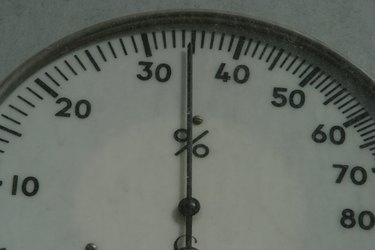
A humid environment inside your home can be a problem because it encourages the growth of mold, dust mites and bacteria. This can lead to an unpleasant, musty smell and even become a possible health hazard. There are some steps you can take to lower the humidity level inside your home to prevent these issues. If you aren't sure if there is a problem, you can use a hygrometer from a hardware store to measure the relative humidity. Indoor humidity should be maintained at less than 50 percent.
Step 1
Ventilate areas properly. Humidity can build up indoors without enough fresh air circulation. You can hire a ventilation expert to come to your home and help with this. Ventilation is especially important in the bathroom, where there is high moisture due to showering. Make sure there is a fan in proper working order.
Video of the Day
Step 2
Monitor your air conditioning. Generally speaking, central air conditioning dehumidifies the air. However, if there is an area that is over-cooled, it can trigger condensation, leading to higher humidity. If there is an area that is very cold and clammy, reduce the cool air supply to that area.
Step 3
Check your dryer's air discharge hose. The hose should be free of obstructions and should discharge the air to the outdoors. If air is discharging indoors, it may be causing higher humidity.
Step 4
Check for dampness in basements and crawl spaces. If you have a damp basement, you may want to hire a professional to find and eliminate the source of the moisture. If water is leaking into the basement, it can be a big problem that needs to be addressed. Sometimes dampness can be reduced in these types of areas by laying down sheets of plastic with sand or gravel on top.
Step 5
Buy a dehumidifier. Dehumidifiers are electrical appliances that take humidity out of the air and then drain the water collected. If you are using a dehumidifier in temperatures lower than 65 degrees Fahrenheit, make sure you buy a unit that is designed specifically for low temperatures that will automatically defrost itself when needed. Most models are designed to operate in temperatures higher than 65 degrees. Buy a dehumidifier that is appropriate for the amount of space it needs to dehumidify. It will use approximately the same amount of electricity as a window air conditioning unit of the same size.
Video of the Day